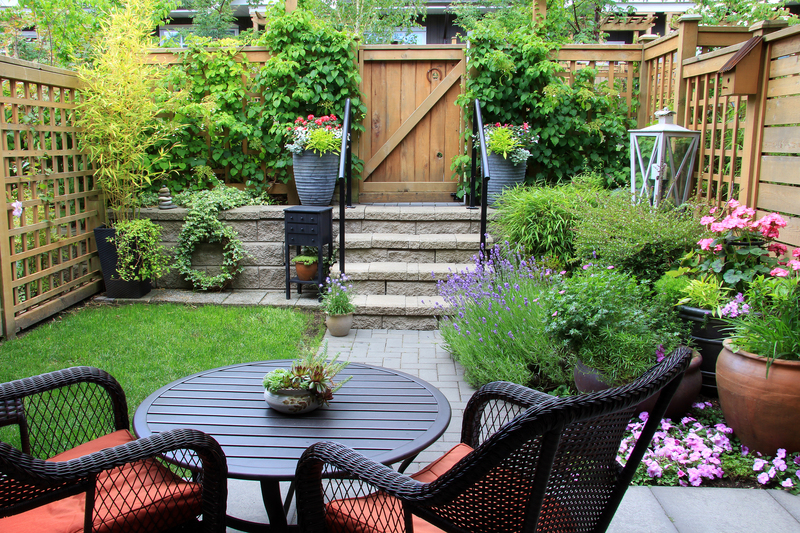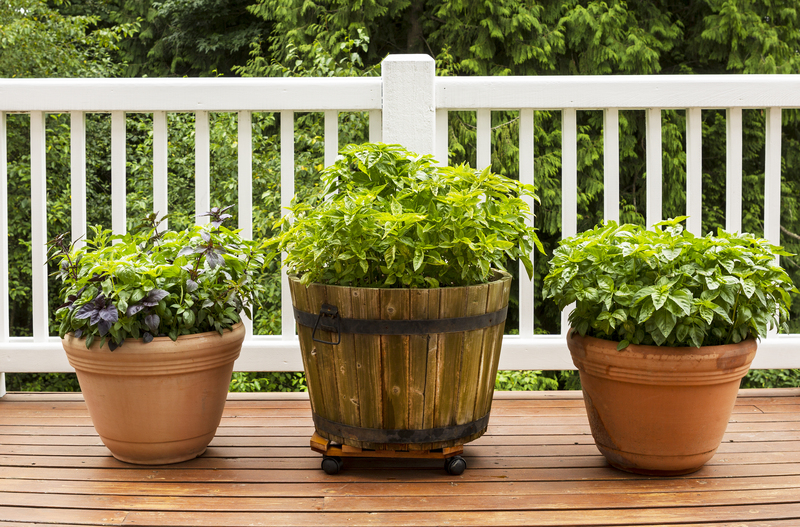Transforming Food Waste into Garden Gold
Posted on 18/06/2025
In today's fast-paced world, food waste has become a significant environmental challenge. But did you know that your kitchen scraps could hold the secret to a thriving, lush garden? Welcome to the world of transforming food waste into garden gold! This comprehensive guide will explore how to convert everyday leftovers into nutrient-packed compost, enhancing soil fertility and reducing landfill waste. Discover smart techniques, unique insights, and expert advice on achieving a zero-waste lifestyle while cultivating a flourishing garden.
Why Food Waste is a Hidden Garden Treasure
Every year, millions of tons of food waste are sent to landfills, releasing harmful greenhouse gases. Yet, if managed wisely, these discarded peels, coffee grounds, and eggshells can become valuable resources for organic gardening. Composting not only reduces landfill burden but also enriches the soil, boosts plant health and encourages sustainable living practices. Turning food waste into compost is a crucial step towards gardening sustainability and environmental stewardship.
Environmental Benefits of Composting Food Waste
- Reduces methane emissions from landfills by diverting organic matter.
- Promotes healthy soil teeming with beneficial microbes.
- Decreases reliance on chemical fertilizers, which can harm soil ecosystems.
- Supports biodiversity and improves resilience of garden plants.
Economic Value: Saving Money While Growing Abundance
- Lowers gardening costs by producing your own rich fertilizer.
- Reduces household waste disposal fees.
- Enhances crop yield and quality without synthetic inputs.

How to Transform Food Scraps into Nutrient-Rich Compost
The journey from kitchen waste to lush harvest begins with understanding the science of composting. Here are the essential steps for converting food scraps into garden gold:
1. Choosing the Right Composting Method
- Traditional Backyard Composting: Perfect for larger gardens; uses open piles or contained bins.
- Vermicomposting: Employs worms--typically red wigglers--to rapidly decompose organic matter, ideal for smaller spaces.
- Bokashi Composting: An anaerobic, odorless method that breaks down even dairy and meats with special microbes.
- Tumbler Composting: Easy to turn; speeds up the decomposition process with regular aeration.
2. Collecting and Sorting Food Waste
Not all kitchen waste is suitable for composting. For best results in turning waste into garden fertilizer, separate scraps into the following:
- Compostable: Fruit and vegetable peels, coffee grounds, tea bags, eggshells, nut shells, bread, rice, cooked pasta, shredded newspaper, cardboard, leaves.
- Avoid: Meat, dairy, oils, disease-infested plants, chemically treated wood, pet waste.
Tip: Cut scraps into smaller pieces to accelerate decomposition!
3. Balancing Greens and Browns
A healthy compost pile requires a balance of "greens" (nitrogen-rich) and "browns" (carbon-rich) matter. Layer food scraps (greens) with dry leaves, cardboard, or shredded paper (browns) for optimal microbial activity. The ideal ratio is roughly 1:2 - one part greens to two parts browns.
4. Proper Compost Maintenance
- Turn the pile regularly to introduce oxygen for aerobic bacteria.
- Monitor moisture--your compost should be damp but not soggy.
- Keep pests away by covering fresh scraps with browns and using enclosed bins.
- Patience pays off: in 2-6 months, your pile will become dark, crumbly, and earthy-smelling--ready for the garden!
5. Harvesting and Using Finished Compost
Once your compost looks like rich soil and has an earthy aroma, it's ready to use. Ways to apply your garden gold:
- Top-dress flower beds or vegetable rows for slow-release nutrition.
- Mix into potting soil to boost container plant growth.
- Broadcast as lawn amendment for thick, healthy grass.
- Create compost tea by steeping it in water for an instant plant tonic.
10 Supercharged Food Scraps for Your Garden's Success
Not all food leftovers are created equal! Here are some all-star items for turning kitchen waste into garden fertilizer:
- Banana peels: Potassium-rich; great for fruiting and flowering plants.
- Coffee grounds: Slightly acidic; perfect for acid-loving berries and hydrangeas.
- Eggshells: High calcium levels help prevent blossom end rot on tomatoes and peppers.
- Fruit peels/cores: Provide micronutrients and accelerate compost maturity.
- Tea bags: Add nitrogen and organic matter.
- Vegetable trimmings: Excellent green matter source.
- Nut shells: Slow-release carbon and texture improvement.
- Bread: Adds structure, but use in moderation to avoid pests.
- Onion skins: Trace minerals for robust growth.
- Paper towels/napkins: Soak up moisture and balance greens.
Composting Pitfalls and How to Avoid Them
While transforming food scraps into garden boosters is largely trouble-free, some common mistakes can hinder your compost's transformation:
- Overloading with greens: Causes slimy, smelly piles. Balance with extra browns.
- Drought-dry piles: Slow decomposition. Mist lightly to maintain dampness.
- Neglecting airflow: Results in anaerobic (smelly) conditions. Turn the pile weekly.
- Composting meat/dairy: Attracts pests and can harbor pathogens. Omit these for home composting.
- Ignoring pests: Secure bins with tight lids; bury food scraps deeper.
Pro tip: If you travel often or lack outdoor space, try indoor worm bins or Bokashi fermentation for stress-free composting!
Vermicomposting: Worms as Composting Champions
*Vermicomposting* is an exciting way to turn kitchen waste into garden gold--right under your sink! This method relies on red wiggler worms, which eagerly devour food scraps and transform them into worm castings, a nutrient powerhouse for your plants.
- Set up a worm bin in a shady, indoor spot.
- Add moist bedding--shredded paper, cardboard, or coconut coir.
- Introduce red wigglers and feed with fruit/vegetable scraps.
- Harvest castings every few months for the ultimate garden superfood.
Fun fact: Worm casting tea is a plant immune booster and root stimulant!
Bokashi: Fermenting Your Way to Soil Riches
If you want to compost all foods--including meats, dairy, and oily leftovers--Bokashi composting is a revolutionary technique. It uses beneficial microbes to ferment food waste anaerobically, without odors. Bokashi pre-compost can be buried in the garden or added to traditional compost to finish breaking down, delivering a flush of nutrients to your soil.
- Layer food scraps with Bokashi bran in an airtight bucket.
- Let ferment for 2-3 weeks.
- Bury pre-compost directly in garden beds for rapid soil enrichment.
*The result? Rapid, pest-free breakdown of even tricky kitchen waste!*
Direct Application: Quick Tricks for Food Waste Fertilizer
Short on time? You can often use kitchen scraps directly in the garden. Here are some quick & effective methods:
- Chop & drop: Bury banana peels, eggshells, and coffee grounds directly in planting holes.
- Eggshell powder: Crush & sprinkle around tomato plants to prevent calcium deficiency.
- Compost tea: Soak vegetable scraps in a bucket of water for 2-3 days, then water your plants with the nutrient-rich solution.
Community Composting and Urban Solutions
Living in an apartment or city? Many communities now offer food waste drop-off and urban compost programs. Get involved and help transform food waste into citywide garden gold:
- Local farmers' markets often accept kitchen scraps for compost.
- Participate in municipal curbside compost collection if available.
- Support or start community gardens utilizing food waste as fertilizer.
Transforming Food Waste: Success Stories
Many gardeners and urban farmers have seen remarkable results by integrating food waste composting into their routines.
- Home gardeners report 20-30% yield increases after amending soil with kitchen compost.
- Schools teach children the value of food, biology, and environmental impact through classroom composting projects.
- Restaurants and cafes donate tons of food scraps annually, feeding local farms and community gardens.
- Community-led composting initiatives turn urban food waste into thousands of pounds of garden-ready compost each year.

Frequently Asked Questions about Turning Food Waste into Garden Gold
- Is all food waste compostable? No. Avoid meats, dairy, and heavily processed foods in home compost. Stick to plant matter and eggshells as your primary material.
- How long does it take to transform kitchen waste into compost? Depends on your method: traditional composting takes 3-6 months, while vermicomposting and Bokashi can be ready in as little as 2 months.
- Does composting food waste create odors? When balanced and properly maintained, compost should smell earthy--not rotten!
- What are the signs of finished compost? Dark, crumbly texture and a pleasant, earthy smell.
- Can I compost in a small apartment? Absolutely! Try worm bins or Bokashi buckets for compact, odor-free composting.
Conclusion: Changing the World One Scraps at a Time
Transforming food waste into garden gold is more than a trend--it's a smart, sustainable practice with deep rewards. By reclaiming your kitchen scraps, you foster healthier gardens, reduce landfill waste, and contribute to a greener planet. Whether you choose classic composting, engage in worm farming, explore Bokashi, or get involved in community composting, your efforts will cultivate both thriving plants and a healthier environment. Start today--let your leftovers nourish your soil, and watch as your garden blooms with vitality and abundance.
Ready to transform your food waste?
Join the garden gold revolution and turn every scrap into growth! Share your composting tips and garden successes in the comments and inspire others to make a difference--one banana peel at a time.
Latest Posts
Designing Your Perfect Vertical Garden
Secrets to Building a Durable, Wind-Resistant Garden
Kid-Friendly Gardening Tips for a Dream Backyard

